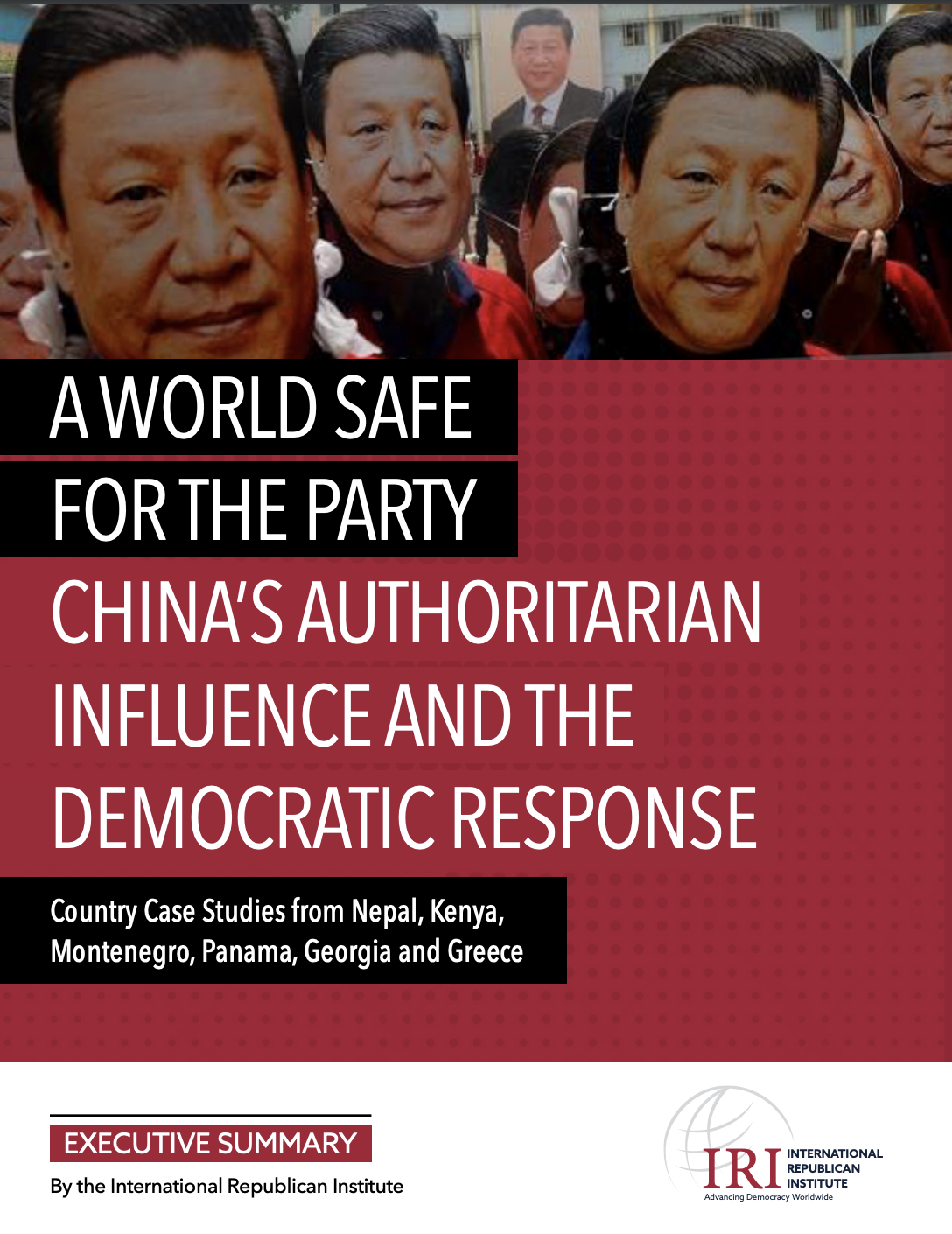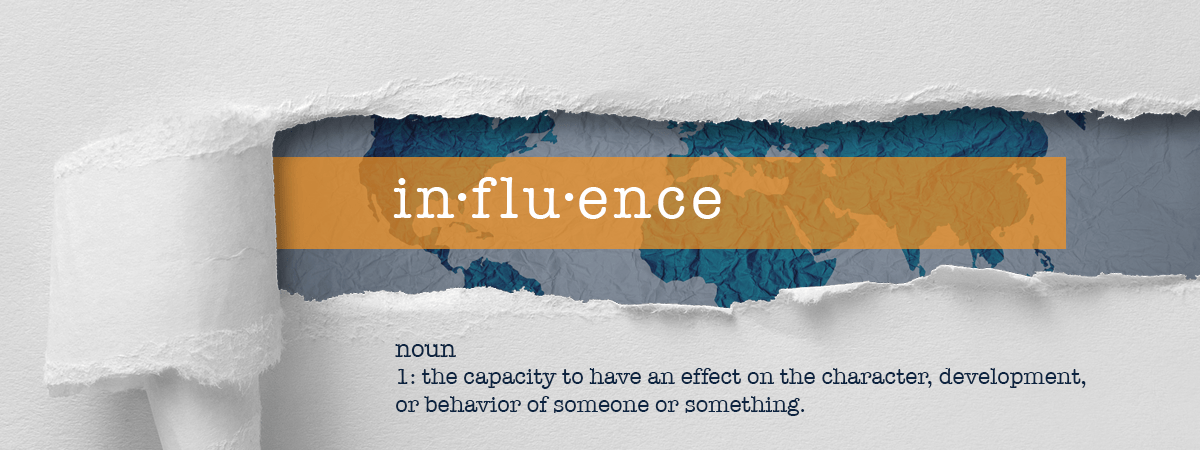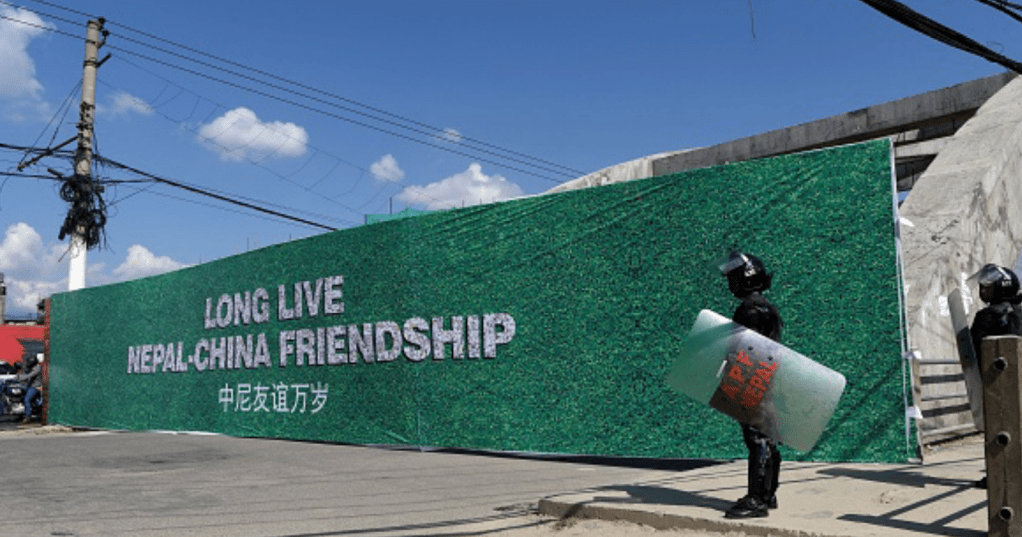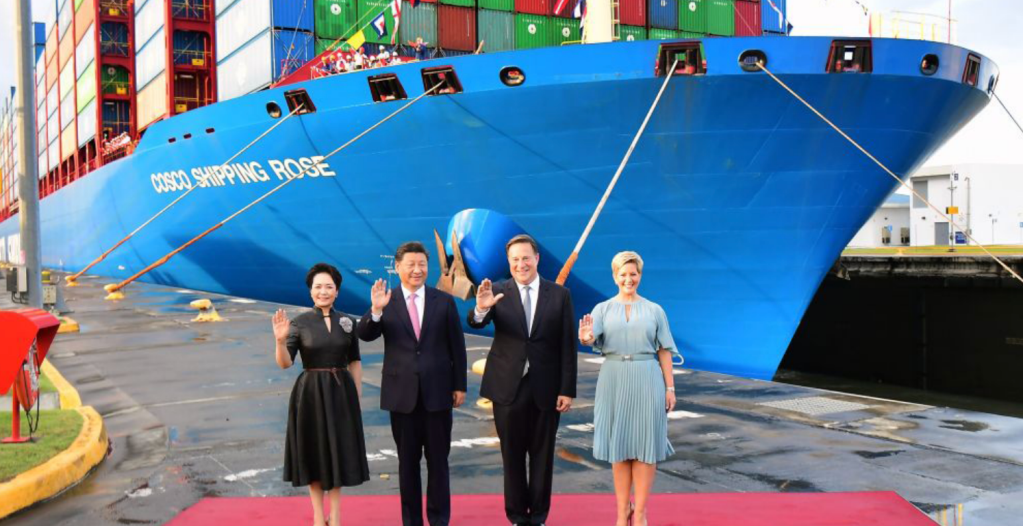China Expands Global Authoritarian Influence Efforts: Some Fragile Democracies Show Resilience Against CCP Aggression
A new report from Building Resiliency for Interconnected Democracies in Global Environments (BRIDGE) initiative, analyzes influence tactics the Chinese Communist Party (CCP) has leveraged to protect its global interests and export its authoritarian model worldwide.

Washington, D.C. – A new report from the International Republican Institute’s (IRI) Building Resiliency for Interconnected Democracies in Global Environments (BRIDGE) initiative, A World Safe for the Party: China’s Authoritarian Influence and the Democratic Response, analyzes influence tactics the Chinese Communist Party (CCP) has leveraged to protect its global interests and export its authoritarian model worldwide.
Introduction
In 2020, the Chinese Communist Party (CCP) demonstrated a more aggressive approach to using its tools of influence to protect its expanding global interests and promote its authoritarian model, particularly to shape narratives around the emergence of the coronavirus pandemic in China and mounting concerns about China’s human-rights abuses at home. In addition to continuing to leverage opaque economic deals, as outlined in the International Republican Institute’s (IRI’s) 2019 report, “Chinese Malign Influence and the Corrosion of Democracy,” the CCP demonstrated a willingness to more readily employ economic coercion and more aggressively manipulate the information space.
These tactics were employed with vigor across the developing world. The CCP has expanded its influence in vulnerable countries, weakening democratic institutions while supporting illiberal actors and ideals. Indeed, China’s actions in the past year demonstrate that Beijing views mounting influence in developing countries as central to its competition with the United States and its democratic allies to determine the future of international institutions, global discourse, and the norms and technological standards that will determine the course of the next century. The popularization of authoritarianism in developing countries helps to realize the CCP’s vision of a revised global order in which a plurality of governance models — democratic and authoritarian — can exist, legitimizing its bid to establish a CCP-led China as the central node of globalization and global governance in decades to come.

- Podcast
- China
Chinese Malign Influence
China exerts its influence to seek beneficial political and economic outcomes throughout the world.
In the COVID era, the party’s campaign for influence in the developing world is manifested in donations of personal protective equipment (PPE) and promises to deliver vaccines, cultivating an image of a benevolent global power while eroding confidence in the ability of liberal democracies to provide public goods. The CCP has used its COVID-19 response to accelerate outreach to political parties in the developing world, using such party consultations to popularize and legitimize its methods of authoritarian governance and development. These engagements complement a global propaganda campaign to selectively highlight the shortcomings of democracies relative to China’s own whitewashed pandemic response, as well as to aggressively silence critics of the official CCP narrative.
This report consists of condensed versions of research findings on Nepal, Georgia, Greece, and Montenegro. It also includes deep-dive studies on two countries, Kenya and Panama, which document in detail the CCP’s efforts to shape views and policy toward China, and the impact of these efforts on each country’s governance and relationship with Beijing. The country studies are ordered starting with those most susceptible to Chinese influence efforts. The findings underscore the pernicious effects of simultaneous unchecked CCP influence in democracies’ economies and their internal discourse on China. Together with studies provided on Cambodia, Pakistan, Sri Lanka, Serbia, Ecuador, Zambia, Mongolia, Hungary, the Gambia, Myanmar, Malaysia, the Maldives, and Australia in IRI’s 2019 report, this research highlights the varied nature of CCP influence on individual democracies and the commonalities across countries.
Economic influence remains the foundation for China’s growing leverage, with the corrosion of democratic institutions a frequent byproduct of Chinese-government-linked entities’ non transparent business practices, but the studies in this report further underscore how China is using opacity and corruption in economic dealings. Even as Beijing has pulled back from lending to support foreign infrastructure investment due to economic factors, domestic pressures and foreign scrutiny, numerous countries’ debt burdens are mounting as a result of deals struck with Chinese entities.
However, it is in the information domain where the CCP is significantly ramping up its drive for influence by manipulating narratives through traditional and digital media, United Front work and investment in telecommunications infrastructure. The CCP capitalizes on control over the Chinese language news space in developing countries and the growing reach of People’s Republic of China (PRC) state media with nearly exclusive control of news on China routed to prominent newspapers, government agencies and community networks. This effect is most pronounced where Chinese government-linked enterprises have established dominant control over telecommunications infrastructure such as digital television, effectively becoming information gatekeepers by providing preferential broadcasting access to state media and friendly news sources while obstructing Western portals and critical voices.

These efforts are compounded as Chinese government representatives in countries take more proactive, “wolf warrior” postures in their local engagement, taking to social media and, in some cases, threatening local media to retaliate against negative coverage of China. This behavior has incentivized some governments to distance themselves from media outlets critical of China and silence efforts to expose malign behavior. Conversely, it has also sparked solidarity movements across civil society and prompted united condemnation of China’s efforts to undermine liberal institutions.
In spite of the CCP’s expanding influence efforts over the past year, the case studies in this report demonstrate momentum toward greater democratic resilience across the developing world. In support of these trends, IRI is engaging the growing number of partners around the world taking action to expose the CCP’s malign influence efforts, bolstering their capacity to mobilize for official change and to protect their countries’ democracy and independence.
Executive Summary of Key Findings
Instrumentalizing Economic Influence
China’s mounting economic engagement with countries across the developing world remains the foundation of its leverage and influence. Chinese investment and trade are critical for many developing economies, but Chinese entities’ business and negotiating practices frequently produce negative consequences for recipient countries’ finances and democracy. China is also instrumentalizing the opacity and corruption that define many asymmetric deals with willing local governments to achieve strategic advantages in key countries.
Opacity continues to shroud lopsided agreements brokered between governments with lax transparency standards and Chinese banks and state-owned enterprises (SOEs), exacerbating debt burdens and creating dependencies.
In nearly all cases included in this report, negotiations with Chinese SOEs have bypassed procurement processes entirely and were conducted behind closed doors.
In Kenya, major infrastructure projects implemented by Chinese SOEs, such as the Standard Gauge Railway linking Mombasa to Nairobi, were negotiated behind closed doors and their terms remain unavailable to the public. There are currently more than 400 registered Chinese companies in Kenya that win more than half of federal construction contracts.
Even where transparency and public procurement processes are improving, details on tenders awarded to Chinese enterprises are kept from public scrutiny, as demonstrated by regularly closed tenders in Panama. This lack of transparency has allowed governments to continue to award construction contracts to Chinese SOEs despite their shoddy completion record and reputation for environmental degradation and corruption, as in the case of SinoHydro’s projects in Georgia.
Terms of Chinese investment deals often reduce broader benefits for local economies.
Chinese lenders often require that projects be awarded to Chinese enterprises with a preference to conceal contractual terms. As a result, local Kenyan enterprises and workers are excluded from the monetary benefits of Chinese investment and opportunities are lost to build human capital. Montenegro is similarly unlikely to reap broader benefits from Chinese infrastructure investment as the China Road and Bridge Corporation’s (CRBC) terms ensure the use of Chinese labor and materials in Montenegro.
Despite a significant slowdown in Belt and Road Initiative (BRI)-related lending, countries continue to suffer the effects of signing up to poor terms for Chinese infrastructure deals.
Nowhere is this clearer than in Montenegro, where a loan from the Export-Import Bank of China ballooned national debt to 82 percent of gross domestic product (GDP) to fund the first phase of construction for a project that failed to pass two feasibility studies. The full terms of the contract, including potential collateral of Montenegro’s national assets, have been kept from the public, and the government has nearly ceded all leverage in future negotiations by deferring arbitration to China.
Corruption is inherent to deals with Chinese-government-linked entities, leading to elite capture and ensuring favorable political outcomes for the CCP.
To facilitate a favorable environment for Chinese enterprises and encourage pro-China foreign policy decisions, the Chinese government has lavished foreign leaders and their coterie with personal “donations” and market access for their privately owned companies. In the case of Panama, the shift in recognition from Taiwan to the PRC appears to have been driven by payoffs to leadership.

Intensifying Focus on Information Manipulation
The CCP is increasingly complementing its economic leverage with efforts to shape the information space to protect its strategic interests in individual countries and advance its preferred narratives globally.
The CCP has expanded its use of tactics detailed in the first report to shape the media environment: content-sharing arrangements that allow for official propaganda to be printed in local media as authoritative news on China, all-expenses-paid training tours for journalists, and Chinese investment in local radio and television stations to cultivate a global media network of pro-China voices.
- In Panama, Xinhua has successfully become embedded in domestic outlets’ coverage on China with regular appearances of Xinhua newswire articles in major daily newspapers El Siglo and La Estrella de Panamá.
- The CCP has courted journalists from nearly all of the countries cited in this report, sponsoring lavish “media tours” of China to cultivate and co-opt friendly voices in the press. Implicit in these trips is the expectation that foreign journalists will advance a positive narrative about China in future coverage.
- A Georgian multimedia site was quietly part of a network majority owned through a subsidiary by China Radio International, China’s state-owned international broadcaster, until it withdrew its holdings amid a tax-fraud investigation.
- United Front work is increasingly a key element of the CCP’s expanded information operations, particularly in countries with sizable diaspora populations. The breadth and degree of coordination between the central government and United Front organizations abroad permits the CCP to reduce the space for independent and pluralistic voices in Chinese-diaspora communities and to insert itself to speak on behalf of those communities.
- In Panama, where there is a Chinese diaspora community of more than 200,000 people, United Front organizations have successfully positioned themselves in leadership roles, acting as interlocutors between the community and the Panamanian government. United Front-linked media organizations have also been building out a parallel Chinese-language information space, providing translations of local news to the diaspora community while delivering content on China that is heavily reliant on Chinese state media and closely aligned with the party’s perspectives and sanctioned narratives
- China’s significant investments in communications infrastructure have facilitated efforts to push proCCP narratives. For example, the Chinese-government-linked company StarTimes was selected as the exclusive contractor for upgrading Kenya’s telecommunications infrastructure from analog to digital. StarTimes has provided preferential treatment to state-run media outlets that push pro-CCP narratives while simultaneously limiting access to more critical Western media outlets through outright prohibitions or placement behind a steep paywall.
- China’s expanding digital influence operations, including on global social media, are a growing factor in enabling the CCP to shape perceptions of China and its policies in individual countries, which has been especially prevalent during the COVID pandemic. The CCP has expanded its drive to shape the narrative on sensitive topics for China, utilizing propaganda and disinformation to manipulate information regarding its handling of COVID-19, repression in Hong Kong and detention of more than one million Uyghur Muslims in Xinjiang.
Mounting Risks for Democracies
China’s business practices and corruption can ensure decisions critical to countries’ prosperity and independence are made based upon elites’ private interests — and those of China — rather than in the public interest. Greater CCP influence over civil society and the information environment inhibits exposure of these dynamics and prevents accountability. Elite capture has been used to great effect to help Chinese companies like Huawei enter new markets, benefiting few with financial kickbacks while potentially exposing key infrastructure and private data to a company that is ultimately accountable to the CCP’s National Intelligence Law.
In Nepal, Huawei paid kickbacks to political advisers of the Nepali prime minister for their support securing a contract to build out the “digital action room” and cut out domestic competitors. These advisers had significant contact with Huawei leading up to the deal.
Corrosion of citizen trust in the democratic process. When they do come to light, opaque deals with Chinese SOEs and subsequent allegations of corruption and democratically elected but increasingly unaccountable leaders exacerbate the fragility of democratic institutions of many countries and erode confidence in democratic leaders and institutions. This dynamic is a buoy for China’s effort to cast doubt on the efficacy of democracy and legitimize its illiberal governance model.
Greater Chinese influence over internal political decisions and dynamics. For example, Nepal, once a stalwart supporter of Tibet in the face of CCP repression and a haven for Tibetan refugees, has acquiesced to the Chinese government’s demands as it becomes increasingly reliant on China economically and wary of punitive action, particularly under the CCP-friendly Nepal Communist Party. The Nepalese government now regularly revokes the legal status of refugees who flee Tibet. Nepalese political parties have preemptively disciplined members who support Tibetan autonomy. The CCP’s intervention to settle factional rifts in the Nepal Communist Party to ensure its hold on power shows how Beijing is taking a more active approach to supporting political allies in key countries.
Panama’s decision to switch diplomatic recognition to the PRC from Taiwan was shaped to a significant degree through CCP influence with the ruling Juan Carlos Varela government, including a $143-million donation to the country, Chinese market access for Varela’s alcohol company, and leveraging the Chinese diaspora in Panama. In a government-appointed body representing the Chinese community in Panama as the country debated the switch away from Taiwan, four out of six had strong links to United Front organizations.

Popularization of China’s authoritarian governance model. Over the last year, China has devoted greater energy to pushing authoritarian solutions to the mounting challenges facing developing democracies under COVID-19, even as it denigrated democracy’s ability to deliver for citizens through propaganda and disinformation on global social media.
- The International Liaison Department (ILD) of the CCP has taken the lead in these efforts, organizing workshops and party-to-party trainings to impart its expertise on issues ranging from poverty alleviation to economic-recovery strategies amid the global downturn. Chief among these topics has been “party management.” The CCP has embarked on a sweeping campaign across the Global South; undeterred by travel restrictions during COVID-19, the ILD has been able to engage political parties en masse through virtual formats.
- In countries such as Kenya, the CCP has built on a longstanding relationship with the ruling Jubilee Party, a regular host of CCP training sessions. The Jubilee Party, from the top down, lavished praise on the CCP’s development and governance strategy and ability to “unify” China. Jubilee’s gung-ho China policy has granted the CCP extensive access beyond the central elite to local party officials, holding workshops at every county level in Kenya.
- Ideology has become a growing component of the CCP’s international outreach to likeminded political parties. Workshops on “Xi Jinping Thought” organized by the ruling Nepal Communist Party and the ILD ahead of a state visit by the Chinese leader in 2019 are one of many examples of the externalization of China’s ideological work.
Encouraging Signs of Democratic Resilience
Elections and effective democratic processes are the most decisive means to uproot elite capture, mitigate malign influence and correct course on engagement with China.
- The Laurentino Cortizo government in Panama, elected in 2019, approaches Beijing on a much more cautious footing than that of former President Varela, and has pumped the brakes on trade agreements and infrastructure projects that would exponentially increase the access of Chinese enterprises.
- New leadership following the October parliamentary elections in Montenegro offers an opportunity to pursue more feasible paths toward the completion of expensive, China-financed infrastructure that was arguably a vanity project of the previous leadership with limited economic utility.
Independent media continue to expose CCP political and economic influence efforts, promoting transparency and accountability in dealings with China.
- For example, CCP threats lobbied against independent media in Nepal triggered united and strong pushback. After running an op-ed penned by the former US ambassador to the North Atlantic Treaty Organization (NATO), the Chinese embassy issued threats against the chief editor of the Kathmandu Post. Seventeen editors of different publications issued a joint statement condemning the embassy’s statement.
- Though the Kenyan media environment is increasingly compromised by the outsized role of Chinese state media outlets, investigative journalism has persisted and with great effect. Independent investigative journalists have exposed corruption stemming from deals between the Kenyan government and Chinese SOEs, contractual obligations to Chinese lenders and the impact of debt on the Kenyan taxpayer. These pieces were the basis of the National Assembly’s calls for accountability in the executive branch.
“Resilience fundamentals” — democratic institutions, good governance and an understanding of the CCP playbook — are critical to countering CCP influence operations.
- Civil society is key to holding government officials accountable. For example, think tanks in Georgia continue to pressure the government to correct the lack of transparency surrounding public tenders awarded to Chinese SOEs and bring them in line with the standards clearly detailed in procurement law.
- CCP investments no longer buy it the right to behave with impunity in many countries and unilaterally set terms of agreement with assured protection by host governments. Local businesses and workers unions are beginning to push back against China’s mercantilist behavior in Greece, for example. China’s first investment in Greece’s strategic infrastructure has become a point of contention as China’s shipping company COSCO seeks to displace local business and expand control over operation of the Port of Piraeus, sparking protests and demonstrations.
- National legislatures also play a key role in checking executive actors, including through investigations by the national assemblies and parliaments to address opacity and unveil and deter foul play. Though the National Assembly lost its case in Kenya’s High Court regarding alleged corruption surrounding the government’s decision to provide a single-source tender to China Communications Construction Company and China Road and Bridge Corporation, it regularly holds public debate on the government’s use of federal monies through tenders, including those awarded to Chinese SOEs. This legislative function helps to mitigate the efforts of China’s state-run media outlets to push propaganda and critical voices critical of China.
There is mounting awareness of the CCP’s strategic intent and tactics among democratic actors and willingness to openly discuss mitigating negative effects on democracy
There is growing, if not widespread, understanding of the risks of engagement with China and Chinese-government-linked entities in all countries addressed in this report. Also, discussion of China’s malign behavior has expanded exponentially at the international level, triggered by China’s repression and human-rights abuses, as well as an increasingly aggressive “wolf warrior” approach to foreign engagement and free speech that has ruffled feathers from Europe to the Pacific Islands. There is increased public discussion of the risks posed by China’s global ambitions to open societies and the liberal values that underpin the current international order, and new momentum to turn this rhetoric into policies that will inoculate democratic societies against both CCP influence operations and more overt coercive pressure.
